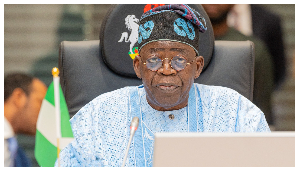Fitch Ratings has affirmed Nigeria’s credit or long-term foreign currency issuer default rating (IDR) at ‘B-‘ with a positive outlook. The ratings affirmation is supported by the country’s large economy, relatively developed and liquid domestic debt market, and large oil and gas reserves, Fitch said.
However, it was noted that Nigeria’s rating is constrained by weak governance indicators relative to peers, high hydrocarbon dependence, weak net foreign-exchange (FX) reserves, high inflation, ongoing security challenges, and structurally low, albeit improving, non-oil revenue.
The positive outlook reflects progress in implementing reforms that improve policy coherence and credibility and reduce economic distortions and near-term risks to macroeconomic stability, Fitch said.
The rating agency noted that these include exchange rate liberalisation, monetary policy tightening, and efforts to restore fiscal discipline, including the absence of deficit monetisation in recent months and phasing out fuel subsidies.
Analyst said the subsequent rise in foreign portfolio investment inflows, greater formalisation of FX activity and official FX inflows have supported the recovery in international reserves.
Nevertheless, short-term challenges remain, Fitch said. The exchange rate remains volatile, and capital inflows have decreased in recent quarters despite high market yields, possibly due to investor concerns over the durability of the reform programme.
Fitch said continued high fiscal spending, along with exchange rate liberalisation, supply shocks, and the deregulation of gasoline prices, have accentuated Nigeria’s structurally high inflation.
It recognised that the Central Bank of Nigeria (CBN) has initiated several measures to address FX liquidity challenges and formalise FX activity to support the currency.
“These include plans to introduce an electronic FX matching platform for all FX transactions effective 1 December 2024, to provide intra-day prices in real-time and enhance transparency.
“The CBN has also raised the monetary policy rate (MPR) five times by a cumulative 850 basis points to 27.25% since February 2024”. However, Fitch believes that the FX market has yet to stabilise, and the ongoing flexibility of the exchange rate remains to be tested.
Fitch anticipates further increase in the MPR in 4Q24, and continued use of prudential and operational tools such as open market operations—at rates closely aligned to the MPR—to strengthen monetary policy transmission after years of financial repression.
“We project inflation, which rose to 32.7% year on year in September due to exchange rate pass-through and higher food and gasoline prices, to average 33% in 2024 and 26.2% in 2025”.
Gross FX reserves rose to USD39 billion in mid-October from a low of USD32.1 billion in mid-April, driven by official disbursements, remittances, portfolio inflows, and an improved trade balance.
The latter is due to lower imports amid rising domestic refining production and the impact of currency depreciation on domestic demand.
“We forecast FX reserves to rise to 6.1 months of current external payments at end-2024 and to average 5.3 months in 2025-26”, Fitch said.
Analysts noted that there is significant uncertainty over the size of net reserves. “We estimate that around one-quarter of current gross reserves are made up of FX swaps with local banks, although we expect most of these to continue to be rolled over”.
Fitch expects Nigeria’s oil refining capacity to rise in 2024-2025 as Dangote Oil Refinery ramps up operations, with an eventual 0.65 mbpd capacity by 2Q25, and meet domestic consumption currently estimated at 50 million litres per day (l/d).
However, current refinery production is 30 million l/d, falling short of domestic consumption, and maintaining FX demand for oil-related imports (about 30% of goods imports).
The refinery will also continue to rely on foreign markets for a portion of its crude oil due to Nigeria’s limited production capacity, sourcing about 59% (0.385 mbpd) domestically at commercial prices.
“We expect crude oil production (excluding condensates) to increase in 2024-2026, averaging 1.4 mbpd, from 1.23 mbpd in 2023, helped by improved onshore surveillance. However, this is still below 2019 levels, reflecting underinvestment in the sector and production outages”.
Fitch forecasts the budget deficit to widen 0.4pp in 2024 to 4.6% of GDP due to higher wages, debt servicing costs and social and security-related expenses.
Analysts project general government (GG) revenue/GDP to rise 3pp from 2023 to 2026 to 10.6%, driven by the impact of currency depreciation on oil and customs revenues, and non-oil tax revenue reforms including VAT hikes, narrowing the deficit to 4.1% in 2026.
Nevertheless, the GG revenue/GDP ratio will remain the lowest of ‘B’ rated peers, largely accounting for a high GG interest/revenue ratio of 30% in 2024.
The government has discontinued its use of CBN ‘Ways and Means’ overdraft in recent months, and banks’ healthy foreign-currency liquidity and strong demand for government securities support domestic financing capacity.
Fitch expects GG debt/GDP to rise to 52.1% in 2024 as a wider deficit and naira depreciation outweigh support from a high GDP deflator.
It said Nigeria’s public debt has a fairly long average maturity of 12.3 years, and nearly 61% is local-currency denominated.
Government external debt service is expected to rise to USD4.5 billion in 2024 and USD5 billion in 2025, with USD3.2 billion of amortisations, including a USD1.1 billion Eurobond repayment due in November.
The government plans to meet its external financing obligations through a combination of multilateral lending, syndicated loans, and potentially from commercial borrowing.
Fitch expects the banking sector’s regulatory non-performing loans to increase in 2024 due to high inflation and interest rates.
However, loan books are small at 35% of banking sector assets in 2023. The CBN recently announced a large increase in paid-in capital requirements for all banks effective end-1Q26.
Additionally, in July 2024 the Senate agreed to impose a 70% tax on large realised FX revaluation gains booked by banks as a result of recent currency devaluation.
“We do not expect this to lead to capital adequacy ratio requirement breaches because it will be staggered over multiple years”.
Business News of Saturday, 2 November 2024
Source: dmarketforces.com

















